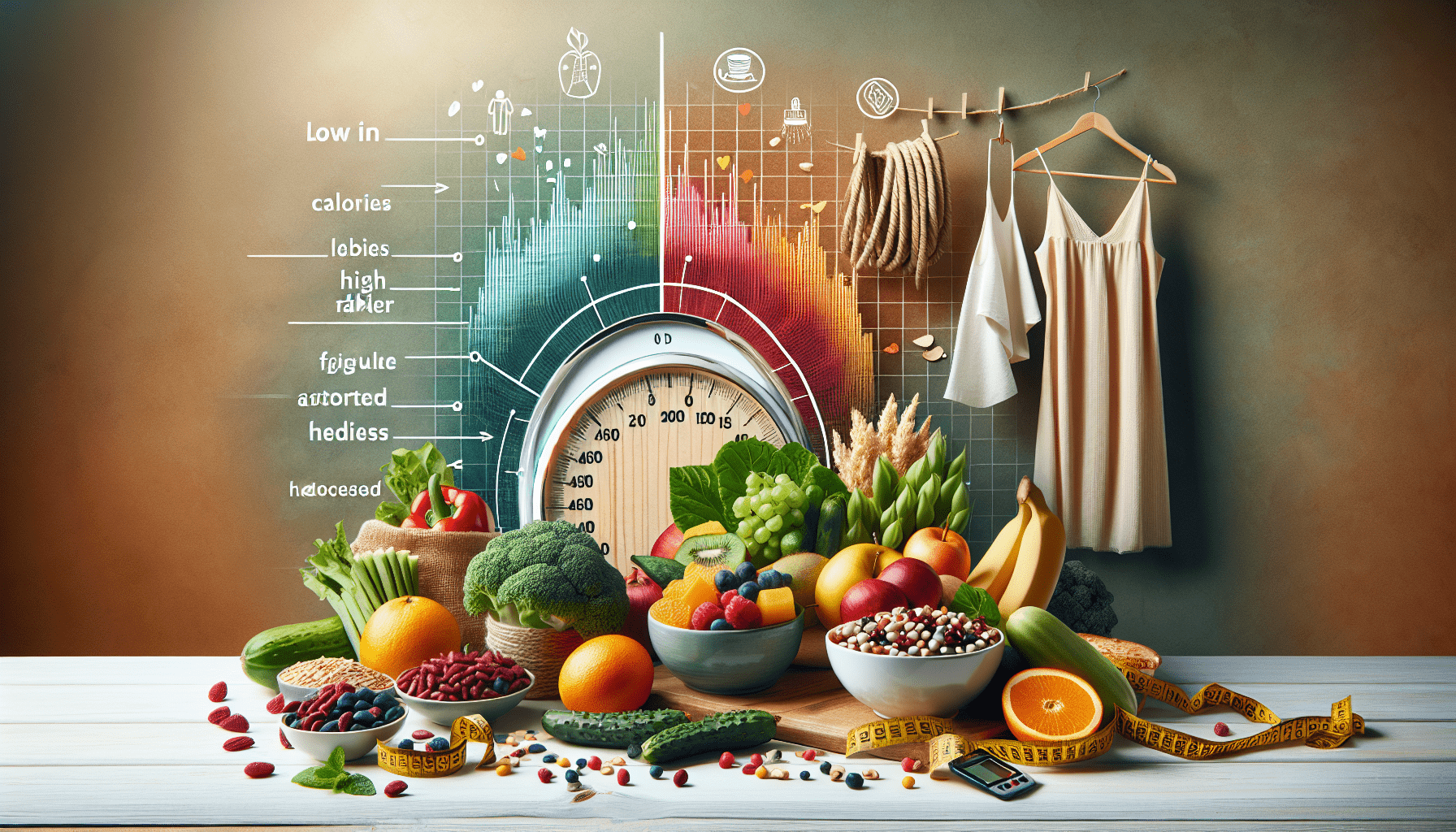Are you looking to shed a few pounds and improve your overall health? Look no further than a plant-based diet! Not only is it a delicious and sustainable way of eating, but it also offers numerous weight loss benefits. By focusing on whole foods such as fruits, vegetables, whole grains, and legumes, you can boost your metabolism, regulate your appetite, and even reduce the risk of chronic diseases. It’s important, however, to note that before embarking on any significant dietary changes, it’s always best to consult a health professional who can provide personalized advice and ensure you meet your nutritional needs. So why not give a plant-based diet a try and see the incredible impact it can have on your weight and overall well-being?
Benefits of a Plant-Based Diet for Weight Loss
Maintaining a healthy weight is essential for overall well-being, and a plant-based diet can be a fantastic tool to support weight loss goals. By focusing on increasing fiber intake, enjoying nutrient-dense foods, reducing caloric density, minimizing hunger, and improving insulin sensitivity, a plant-based diet can help you not only shed excess pounds but also improve your overall health and vitality.
Discover the Ultimate Weight Loss Secrets Here!
1. Increased Fiber Intake
Fiber is an essential component of a well-rounded diet, and a plant-based eating approach naturally provides an excellent source of this nutrient. Dietary fiber refers to the parts of plant-based foods that cannot be digested by the body. There are two types of fiber: soluble and insoluble.
Soluble fiber dissolves in water and forms a gel-like substance in the digestive system. This type of fiber can help lower LDL cholesterol levels, regulate blood sugar, and promote healthy digestion. Foods rich in soluble fiber include fruits, vegetables, legumes, and whole grains.
On the other hand, insoluble fiber does not dissolve in water and adds bulk to the stool, aiding in regular bowel movements and preventing constipation. Examples of foods high in insoluble fiber include whole wheat bread, bran, nuts, and seeds.
By including a variety of plant-based foods in your diet, you can significantly increase your fiber intake. Fiber-rich foods help you feel fuller for longer, keeping hunger at bay and supporting weight loss efforts.
2. Higher Nutrient Density
A plant-based diet provides a wide range of essential nutrients that are vital for overall health. Fruits, vegetables, legumes, whole grains, nuts, and seeds are all packed with vitamins, minerals, and antioxidants. These nutrient-dense foods offer numerous benefits for weight loss and overall well-being.
Not only do they provide essential vitamins and minerals, but they also support satiety, meaning they make you feel satisfied and full after a meal. This can help prevent overeating and unnecessary snacking. By choosing plant-based options that are rich in nutrients, you can meet your nutritional needs while achieving your weight loss goals.

Click Here for Proven Fat-Burning Strategies!
3. Lower Caloric Density
Caloric density refers to the number of calories present in a given volume of food. Plant-based foods tend to have a lower caloric density compared to animal products and highly processed foods. This means that you can eat a larger volume of plant-based foods for the same number of calories compared to other options.
By incorporating more fruits, vegetables, legumes, whole grains, and lean plant-based proteins into your meals, you can increase the volume of food you consume without significantly increasing your caloric intake. This can help create a caloric deficit, which is essential for weight loss.
4. Reduced Hunger
Hunger is a natural bodily cue that signals the need for fuel. However, excessive hunger can lead to overeating and sabotage weight loss efforts. One of the fantastic benefits of a plant-based diet is its ability to reduce hunger.
Plant-based foods, particularly those high in fiber and water content, promote a feeling of fullness and satiety. Fiber absorbs water in the digestive system, expanding and slowing down the digestion process. This, in turn, helps to prolong the feeling of fullness and reduce the urge to snack between meals.
By incorporating more plant-based foods into your diet, you can minimize hunger pangs and cravings, making it easier to stick to your weight loss plan.

Unlock Your Path to a Healthier You!
5. Improved Insulin Sensitivity
Insulin sensitivity is a crucial factor in weight management and overall health. Insulin is a hormone that helps regulate blood sugar levels by facilitating the uptake of glucose into cells. When the body becomes resistant to insulin, it can lead to weight gain and an increased risk of developing type 2 diabetes.
A plant-based diet has been shown to improve insulin sensitivity. The low intake of saturated fats, cholesterol, and refined carbohydrates, combined with the high intake of fiber and antioxidants found in plant-based foods, can enhance the body’s response to insulin and promote weight loss.
6. Plant-Based Diet vs. Other Weight Loss Diets
When it comes to weight loss diets, there are numerous options available, each with its own set of pros and cons. A plant-based diet offers several advantages over other popular weight loss diets.
Compared to low-carb or high-protein diets, which often restrict certain food groups, a plant-based diet allows for more variety and flexibility. It provides a sustainable approach to weight loss without excluding essential food groups. Additionally, a plant-based diet is typically lower in saturated fat and cholesterol, which can benefit heart health and reduce the risk of chronic diseases.
Long-term sustainability is another crucial consideration when choosing a weight loss plan. Many diets may offer short-term results, but they can be challenging to maintain over time. A plant-based eating approach can easily be adopted as a long-term lifestyle, ensuring lasting weight loss and overall health benefits.
7. Meal Planning and Plant-Based Weight Loss
Meal planning is a valuable tool for weight loss success, and it becomes even more crucial when following a plant-based diet. By creating a balanced meal plan, you can ensure that you are meeting your nutritional needs while creating a caloric deficit for weight loss.
A well-rounded plant-based meal plan should include a variety of fruits, vegetables, whole grains, legumes, nuts, and seeds. It is essential to consider portion control to prevent overeating, as even healthy plant-based foods contain calories.
Meal prepping and batch cooking can also be helpful strategies for maintaining a plant-based diet and supporting weight loss. By prepping and cooking meals in advance, you can save time, have nutritious options readily available, and avoid relying on less healthy convenience foods.
8. Exercise and Fitness on a Plant-Based Diet
Exercise is an integral part of any weight loss journey. Whether you enjoy intense workouts or moderate physical activity, a plant-based diet can provide you with the necessary nutrition to support your fitness goals.
Plant-based nutrition offers a wide range of nutrients, including carbohydrates for energy, protein for muscle repair and growth, and antioxidants for post-exercise recovery. By incorporating plant-based sources of protein, such as legumes, tofu, tempeh, and seitan, you can meet your protein needs to support your workouts.
Combining regular exercise with a plant-based diet can boost weight loss results and help improve overall fitness and health.

9. Important Considerations and Conclusion
Before making any significant changes to your diet or exercise routine, it is crucial to consult a health professional. They can provide personalized advice based on your individual needs, medical history, and goals. A healthcare provider can guide you through the transition to a plant-based diet, ensuring you are meeting all your nutritional needs while supporting weight loss.
It is also important to remember that transitioning to a plant-based diet should be gradual. Taking small steps and making sustainable changes will increase the likelihood of long-term success. Experiment with new plant-based recipes, gradually increase the number of plant-based meals in your diet, and explore different cooking methods and flavors.
Lastly, sustaining weight loss with a plant-based lifestyle requires consistency and mindfulness. Continue to prioritize nutrient-dense foods, regular exercise, and a balanced approach to eating. By maintaining these healthy habits, you can enjoy the long-term weight loss benefits of a plant-based diet while supporting your overall health and well-being.
